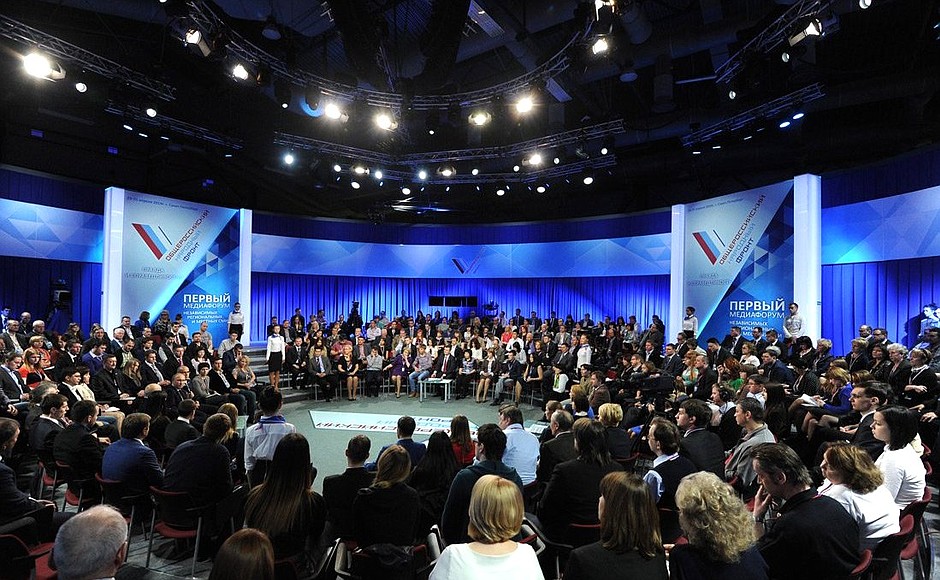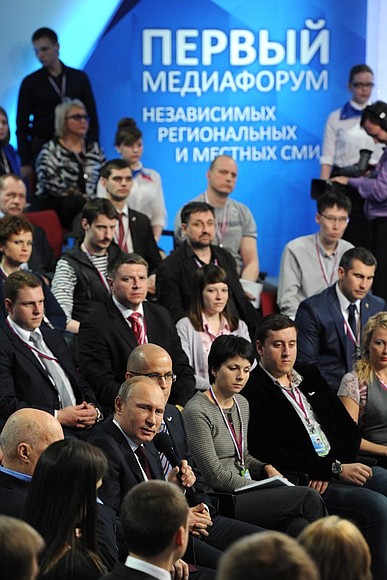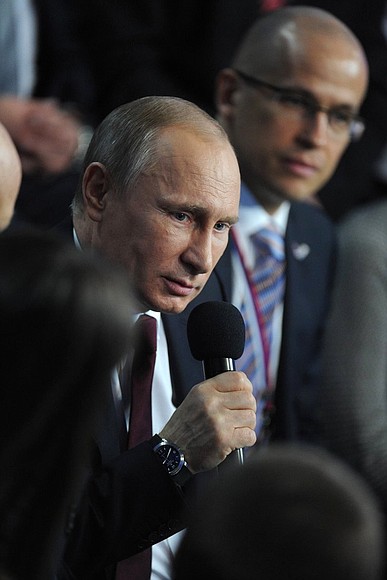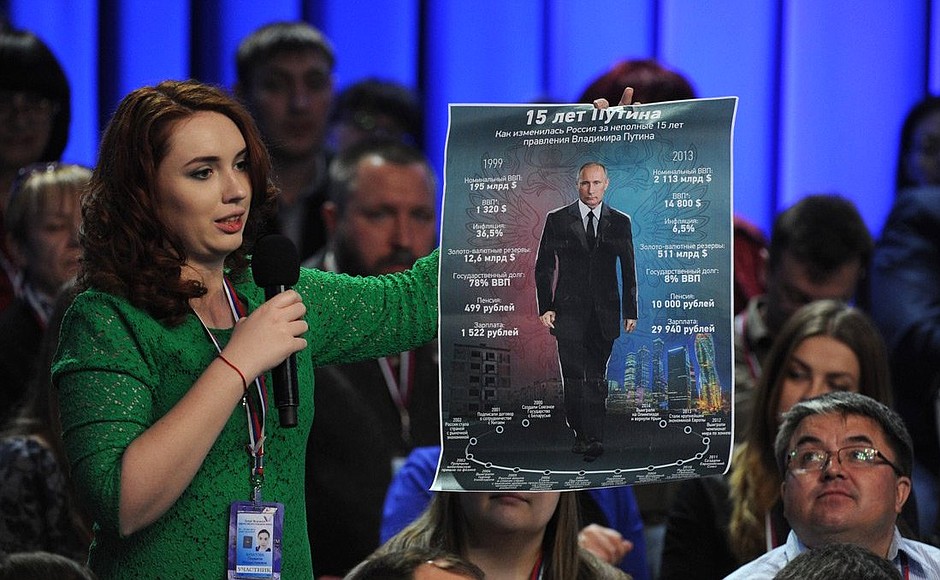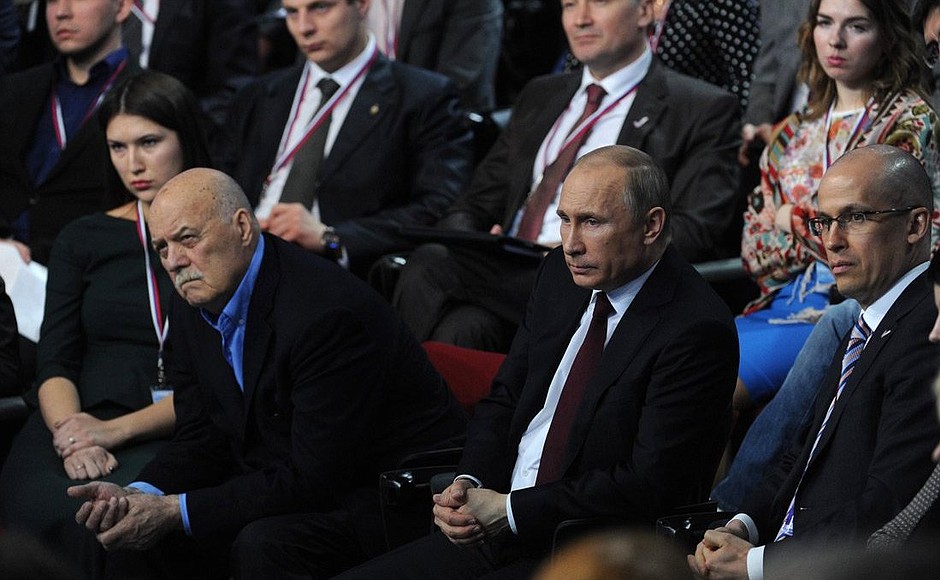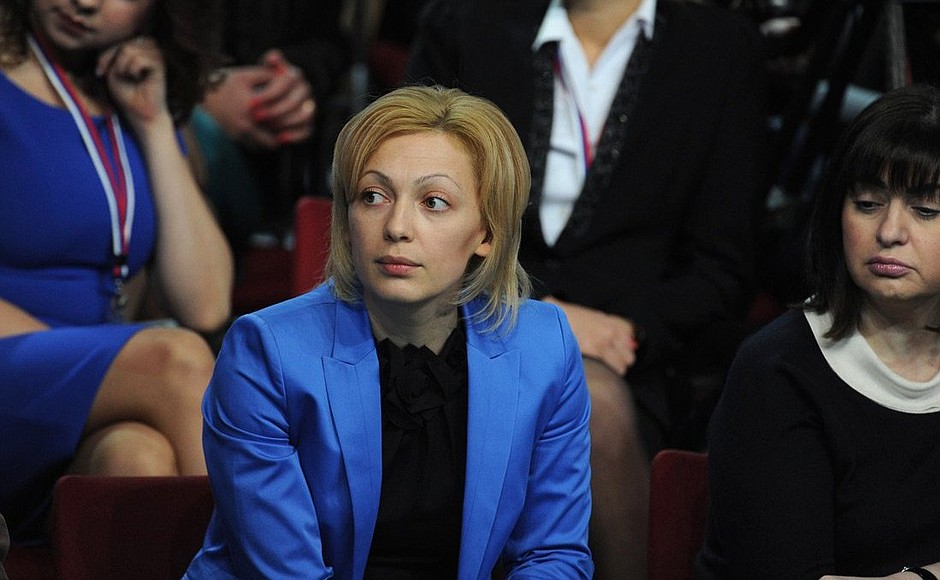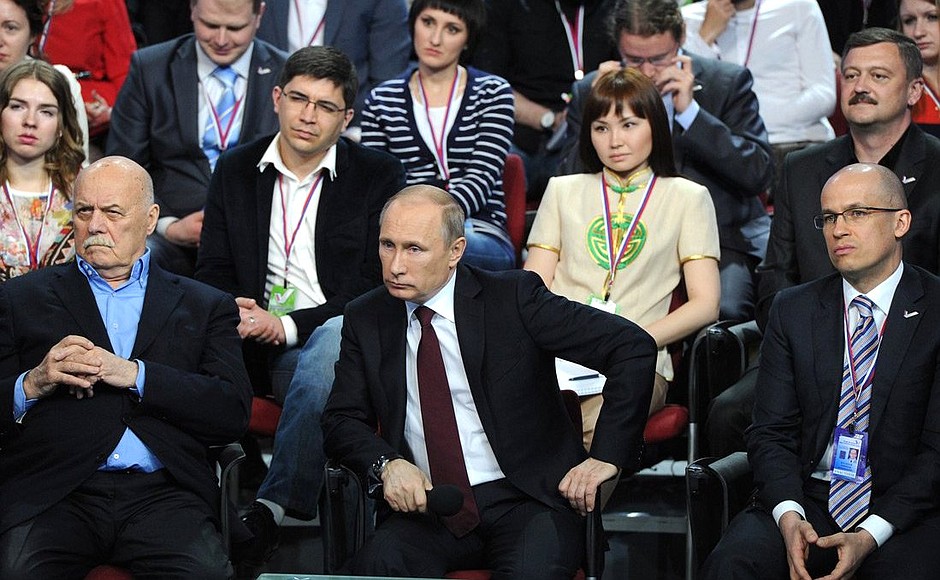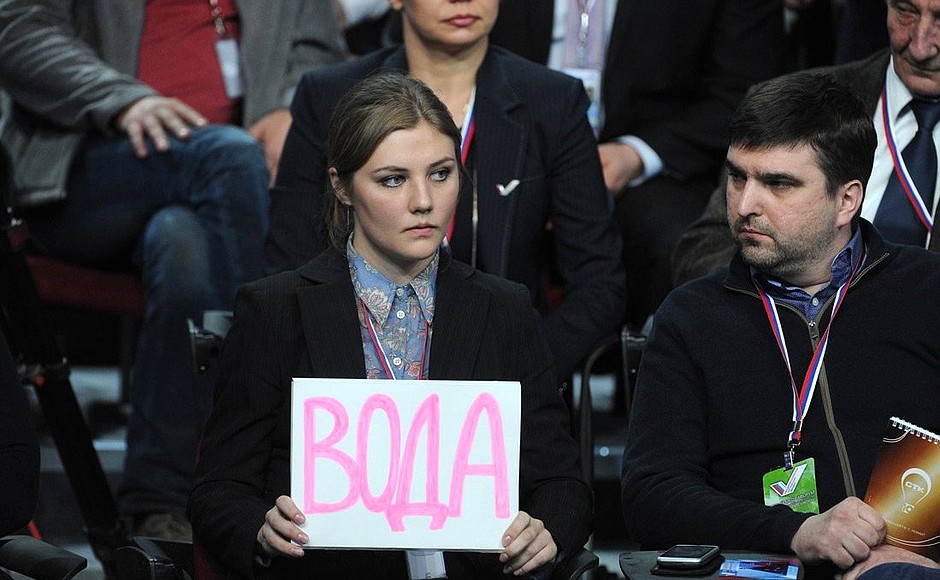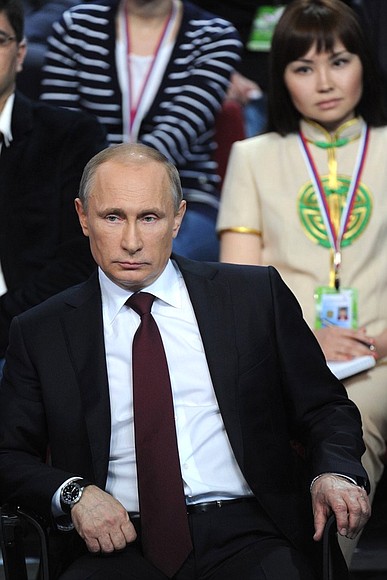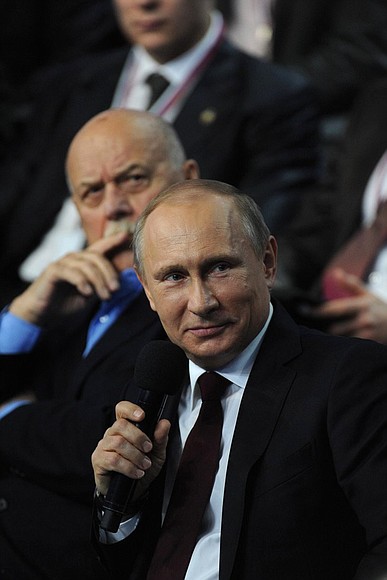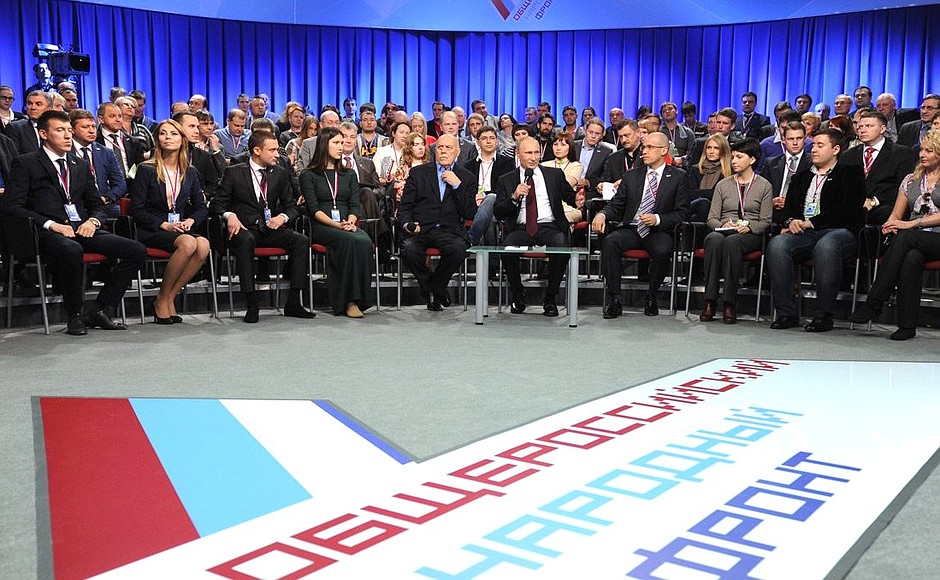Within the framework of the Media Forum, 400 journalists from 85 regions of the country will consider a broad range of issues dealing with the current work and development prospects of modern regional media in Russia.
* * *
Excerpts from transcript of the plenary session of the First Media Forum of Independent Regional and Local Media
President of Russia Vladimir Putin: Good afternoon, everyone. I am happy to greet you here today.
I know this is your second day – the forum began yesterday. I believe this is a very useful and interesting initiative of the Russian Popular Front. You did not come here to attend this meeting, but to exchange information, meet with heads of various federal and regional agencies and develop joint action plans and recommendations for the authorities.
Clearly, as you may all know, the work of local media may not be as charged and exciting as that of some strongly politicised national media outlets based in Moscow or St Petersburg.
Your work is in the highest demand with the public (this is obvious from statistics and polls) because it is focussed on everyday issues in the life of Russian citizens.
In the final count this is what matters most for every person and every family, which is why people have a greater interest in their regional media than in the national ones.
Therefore, this forum the RPF has organised is, in my view, extremely useful, important and interesting. I would like to end my monologue here so that we can use the time to talk.
I will be happy to hear your ideas, and if you have any proposals that you think can be implemented, I will discuss them with the Government and with the [Presidential] Executive Office, and we will try to find solutions.
Thank you for your attention. Let us now have a conversation, an exchange.
<…>
Co-Chief of Staff of the Russian Popular Front Olga Timofeyeva: As a former TV journalist, an information service field reporter, I would like to begin with the most pressing issue.
Our meeting is taking place in a complicated situation. The latest news is that supporters of federalisation, peaceful residents of Eastern Ukraine have been attacked; they even say there are casualties. It seems that what we feared most is in fact happening. What can you say about it?
Vladimir Putin: If this is indeed happening, and strange as it may seem, I have found out about it from the media, just like you – I only just got this information when I arrived here. As far as I know our media were not reporting anything this morning, and now we have these reports.
If the current regime in Kiev really did use armed force against the country’s population, this is undoubtedly a serious crime against the people.
I would like to remind you that even the legitimate President of Ukraine, Viktor Yanukovich, did not use armed force in the conflict in Kiev; he did not resort to force even though he had been elected and had the national mandate to rule the country, even though he was Commander in Chief.
If the current rulers in Kiev have done it, this turns them into a sort of junta, a clique. First of all, they do not have a national mandate to do it. At best, they have some elements of legitimacy, and only in parliament. All the other authorities are illegitimate for one reason or another.
If these people have moved on to a so-called ‘acute phase’… this is no acute phase, this is a punitive operation, and it will undoubtedly lead to consequences for the people who make such decisions, including repercussions in relations between our states.
As for what the further developments will be, we will see. We will make decisions based on the actual events.
First Deputy Head of the Rpf Executive Committee Dmitry Minenko: Mr President, we have journalists from all over the country here. The forum has brought together some 350 people, including journalists from Crimea and Sevastopol. Incidentally, I would like to inform you that branches of the Russian Popular Front have been officially registered in Crimea and Sevastopol. I think it would be right to let them ask the first question.
Olga Burachyonok: Good afternoon, Mr President.
I am Olga Burachyonok and I am from the Crimea television channel.
I think my colleagues from the Crimean delegation will agree that we are very happy to be here, this is wonderful. Many things are changing in Crimea now. You yourself spoke of support for the Crimean economy, agriculture and tourism. However, in the context of this forum I would like to ask: will the media in Crimea and Sevastopol receive support from the state and in what shape and form?
Vladimir Putin: Proceeding from the previous question, I would like to note something that, I believe, is becoming obvious to everyone: if it were not for Russia’s real support for the people who live in Crimea, it would have been impossible for them to freely express their will. We would have had the same situation we now observe in the east and south of Ukraine. It would have been the same or even worse. This is additional proof that we have done the right thing and at the right time. This is the first point.
Second, so that we can close the first question and not come back to it again. Look what happened: we took part in the Geneva meeting, signed certain agreements, the essence of which is that both sides must be disarmed, the administrative buildings freed and so forth. What is happening? Neither the Right Sector, nor any other radical organisation is being disarmed, nobody is freeing anything in Kiev. Quite the opposite: these groups are being legalised. By whom? This is not the path that should be taken, but the path of dialogue between all the residents of the country, wherever they live.
As for Crimea, as I have already said, we could have seen the same developments there as we see now in the east of Ukraine if we had not taken certain measures to protect the people’s interests in Crimea and Sevastopol.
Now regarding support. True, we are developing an entire programme of support for the economy and social sphere in Crimea. As for the media in Crimea and Sevastopol, they are now part of the Russian legal environment and can use all the media support instruments available within the Russian Federation. This is mainly the job of the Federal Agency for Print and Mass Media. There is a whole range of various measures. This year, however, the Government has cut their funding somewhat. Nevertheless, there is a set of instruments: subsidies, VAT reduction of up to 10 percent for print media, support for television and radio networks and internet media that are involved in such social programmes as promoting healthy living, social support for various groups of population and so forth. The Federal Media Agency website has all the information, the complete set. I would like to repeat that the main thing is to make sure this is backed by real funding.
I would like to draw the Federal Media Agency’s attention to something they could do. When they allocate the limited funds at their disposal, I think it would make sense to shift the focus to regional media. Despite all the difficulties, the national media outlets are in a better position both in terms of advertising and access to consumers – it is easier for them. Even though it is not easy for anyone, they are in a better position than the regional media. We will definitely discuss this with the Government, so that we can shift the focus towards regional media.
Olga Timofeyeva: To stay on the subject of Crimea – this is something all the media talk about now, but, amazingly, this is not only on the federal agenda – it is also on the regional agenda, the talk of every town, village and region.
We have someone from Murmansk here. You are welcome to join our conversation.
Yekaterina Andreyeva: Yekaterina Andreyeva, the Murmansky Vestnik newspaper.
A lot of money is now being invested in Crimea. Will other regions remain unaffected? There was information the other day that state funding allocated for the development of the Murmansk transportation hub will be reduced by 75 percent in favour of the port of Kerch.
Vladimir Putin: I know, your Governor asked you to raise this question. She keeps calling me all the time.
Remark: That’s independent media for you.
Vladimir Putin: Yes, I can see that. (Laughter)
Tell her we will not cut the programme. Generally speaking, any mention of cuts in any programme is in no way linked to Crimea, because everything we are doing or planning to do in Crimea will be financed from Government reserves. This year we have about 240 billion rubles in our reserves, even additional reserves, while the entire scope of assistance to Crimea in various spheres, as I said during the Direct Line, does not exceed 100 billion. Therefore, we have sufficient reserves.
As for the Murmansk transportation hub, this is a very important project for our economy. The Government is now assessing all the investment projects. This has nothing to do with Crimea and support for the Crimean economy and social sphere.
A careful analysis of all the planned investments is connected to the overall situation in both the global economy and that of this country. The Government assesses every project from the viewpoint of its economic efficiency.
In this context, the development of the Murmansk transportation hub is undoubtedly an important component of Russia’s economic growth and infrastructure development, as this concerns access to the other side of the bay from where the port is now located. The Murmansk transportation hub – both the sea and rail components – is very efficient, has excellent prospects in terms of access to open sea at a good depth. This is without doubt not only a regional, but also a national project. Therefore, we do not envisage any cuts in the development of the Murmansk transportation hub.
<…>
Alexander Litke: I am Alexander Litke from Tula.
You recently announced the deoffshorisation programme. This is the right policy, of course, because the entire situation in Ukraine, when the country’s elite keep all their assets outside the country, in offshore zones, is strongly reminiscent of the fairy tale about the evil character Kashchei, whose death lies on the tip of a needle that’s hidden inside an egg, the egg is in a box, and the box – on the Cayman Islands under foreign jurisdiction. However, many Russian oligarchs still think that offshore zones are good, as are foreign assets. Will the sanctions imposed on us by our western partners have any positive impact on deoffshoring the economy?
Vladimir Putin: We all know – at least those of us who follow world political and economic developments – that no sanctions can be effective in the modern world. They are all mainly political in their nature. This is one thing.
Second, we are members of the World Trade Organisation, and it has a set of rules and regulations. We can protect our interests within the framework of this organisation.
Do the decisions made by our partners harm us in any way? Overall, they probably do, because ratings are being revised, loans can become more expensive and so forth. This is not critical, but it certainly isn’t a positive effect.
Now, do these sanctions bring us any benefits? Strange as it may seem, they do. The first one is the one you have just mentioned. Many people who keep their savings, and sometimes even parts of their businesses in low-tax areas should wonder, and they are already wondering whether it would be safer to conduct their economic activity, including official registration, in their home country.
As for deoffshorisation, the Russian authorities are also facing a number of important tasks here. It is essential that we create a favourable environment for business inside the country: establish a tax system and maintain its stability, do away with excessive red tape, combat corruption (I am sure we will have questions on that today too) and many other things.
There are also some aspects of the so-called sanctions and that I would say have had a positive effect. What are they? We live in a global world and we speak of a global economy, everything is interdependent. However, excessive dependence leads to a certain loss of sovereignty. Take the distribution of gold and foreign currency reserves: some countries with large reserves tend to diversify. This is one point.
The second is payment systems, the use of plastic cards as a method of payment. We have never thought about it before, we believed that all our partners – Visa and MasterCard – are depoliticised economic entities. It turns out that they are strongly affected by political pressure and tend to succumb to it. Meanwhile, we did not create our own payment system, the way Japan and China did. This means full dependence on these partners.
Incidentally, in terms of profits I think they have made a big mistake because MasterCard and Visa cover over 90 percent of the Russian market and we let them have this share. Payments within the country are made with Visa and MasterCard, and to a large extent this is done on servers located in the United States – this is crazy! Why did Japan set up its own national payment system and is using it?
In this country, our citizens when they are in Russia, not when they make payments abroad, not when they are travelling in other countries, but at home, they come to a shop and pay using this payment system. This is a huge business for these companies. Their current actions are simply undermining trust. I am not talking about any administrative measures on our part now. We do not envisage any such measures, any punishment for unreliable partners. However, they are undermining trust in their own business, which is certain to lead to a loss of a market share.
Our other economic partners should also consider this, and I am sure they are. This is a benefit of sorts, because now we started thinking about it and have even moved on to practical steps (this is not funny, they may be listening to us and may even be happy to learn that we are not only thinking). We began thinking about it a long time ago but never did anything about it, while now we have moved to practical measures to set up a national payment system.
Or take, for instance, payments within major economic sectors, such as communications, the defence industry, the transportation infrastructure and some others. We have to be completely certain that whatever happens in the world – in politics, the economy or in the world of finance – at least payments within these major industries will be conducted without a glitch, without any problem.
Now the Presidential Executive Office, the Central Bank and the Government are all working on a draft law on the operation of these major industries to enhance economic sovereignty. Therefore, this is also in a way a positive effect of the so-called sanctions. Generally speaking, they are bad for everyone, they disrupt the world economy and do not benefit those who use or try to use such instruments.
<…>
Viktor Levanov: My name is Viktor Levanov, and I’m a blogger.
Here is my question: during the developments in Crimea, there were many attacks on Russian websites: sites of TV channels, other media and government organisations. According to experts and to certain data, US special services and the National Security Agency were behind those attacks; they were launched from the territories of the United States, Europe and Ukraine.
It is an open secret that the United States control the Internet. The Patriot Act gives them all the power they need. Now the former agent Edward Snowden has opened our eyes. This Act, adopted 80 years ago, in 1934, still allows the President of the United States to shut down communications on the entire planet with a single resolution. How is this possible?
Take Google. I use Google, for instance, all of its services. I am certain that many government officials and major politicians use Google.
Vladimir Putin: Use Yandex.
Viktor Levanov: I will get to Yandex shortly too, I will get to all of them.
We use Google, which collects users’ personal data. And where does it all go? It all goes to servers in the USA. Hence the question: why can’t they build servers here? I do not want my personal data and information about politicians that run my country to go to the United States.
Now over to Yandex, since you mentioned it.
Vladimir Putin: Let me respond to this part first.
Of course, we can and should do this. The only thing is that it all takes time and capital investment. Meanwhile, everything you said is true, pure and simple, as they say – everything goes through servers located in the United States, everything is monitored there.
You should simply always bear in mind that such is the reality created by the Americans. They are the ones who did it. You know that it all began initially, when the Internet first appeared, as a special CIA project. And this is the way it is developing.
The rest is what has made it to the market and took on huge proportions. Nevertheless, it is initially a military programme, a special programme, and special services are still at the centre of things.
However, I know Yandex, VKontakte and other search engines are trying to develop hardware here, and most importantly, they are also working on software. This is happening, but it takes time and money.
Our companies did not have sufficient resources to invest – now these resources are appearing and the process has begun. I hope it will develop quickly enough and will serve our interests.
Viktor Levanov: May I ask about Yandex now?
Vladimir Putin: Yes, go ahead.
Viktor Levanov: About Yandex: it is good to know that they are developing in Russia and are doing all these things. However, if we speak of the information side of the matter, it is not quite clear what Yandex is: on the one hand we know it as a search engine, where you enter some words and find the information you need; but on the other hand it is a kind of media, because all the time, every day the top five news items Yandex collects from other sources are viewed by millions of people. Meanwhile, Yandex does not have a media license and cannot be held liable under the law as a media outlet because it is a search engine.
I am not suggesting shutting it down or anything. I simply want to know when our Government will begin making decisions to free us of digital aggression. Thank you.
Vladimir Putin: As for protection of information, our special services are also working on it and are introducing special security systems. Primarily this has to do with classified information of the Defence Ministry, the defence industry, and government agencies, primarily federal ones. Some things are moving forward, while others are not going so well.
From what we have learned from Mr Snowden, the US NSA is very efficient. This is a kind of informational confrontation. It always existed, and now it is acquiring new forms on a new technical basis. We have our own special services who are also working on this.
As for the civil sector in general, we already agreed that servers need to be moved and information has to be closed.
Regarding Yandex, things are not that simple either. I will not say now what they can do and how. However, both the Government and the Presidential Executive Office are now working on this issue – I am sure you know it; it is discussed publicly – defining the term ‘media’.
You are a blogger. I will not express any opinion now so as not to take sides, however if a certain person influences the views of thousands, tens of thousands of people, essentially this blog can also be termed ‘media’. It affects thousands of people, maybe even hundreds of thousands, I don’t know. A talented person can do this. Why not?
In this case, it is definitely a media outlet. The public has to understand this, assess it and make a balanced decision in the democratic way, via State Duma Deputies. For instance, they can first have a public discussion, say organised by the Russian Popular Front, in the Civic Chamber and so forth. Only we have to make sure we do not have any excesses here; we should not impose any bans. We must proceed from reality and act accordingly, the way it is done all over the world.
As for Yandex – I repeat, it is not so simple either. We have to ask them what they can and cannot do. However, when they were starting out, they were forced to have a certain number of Americans and Europeans on their management team, remember? And they had to agree to this. This is why it is a national system.
Part of their registration is also abroad. This is done not only for tax purposes, but for many other reasons as well. This is a complicated area. As I have said, this was all created by the Americans and they want to retain their monopoly. However, they say monopoly is bad; it is only good if it is their own monopoly.
It is impossible in the modern world, but we need to consistently protect our interests. The process is underway and the state will support it.
<…>
Yelena Vostrikova: I am Yelena Vostrikova from Voronezh.
This is a media forum, so I would like to ask about journalism. You are regularly asked many questions by journalists from a range of media. For any journalist, talking to you is an event that can change his or her life. What about you? In your case, what characterises a journalist that is interesting to talk to? Perhaps you can give an example of your most interesting, most memorable conversation with a journalist?
Vladimir Putin: In order for a conversation with an individual to be interesting, that person needs to be interesting, regardless of his or her job title.
As for journalism, this is a very interesting and important area of activity. If I were working in this field, what would I strive for? I would strive to become a highly focussed specialist in a particular area, an expert. And then, it will always be interesting to talk to this individual, whether he is a journalist or in another profession, because the conversation stops being just an exchange of information and becomes an exchange of opinions. I think this would also be interesting in our situation and for our viewers, for consumers of this information, because it is easy to find purely factual information today online.
<…>
Vladimir Putin: (Answering a question on the nationalisation of the elites and possible conflict of interest involving people who work in government agencies while holding citizenship from other states or having businesses overseas.) Regarding people working in the government, as you said, particularly in federal agencies. It is true that a conflict of interest is possible. When a person takes on a different citizenship, he swears an oath to that government. And this oath (at least in the US) includes words about devotion and loyalty to their new Fatherland. And when a person who has taken that oath then works within the government agencies of another state, a conflict of interest may occur, in the sense that the interests of our government do not always align with the interests of other governments. We have our own geopolitical and economic interests, as well as interests in developing certain territories and sectors of the economy.
For example, you are actively developing the oil and gas sector in Sakhalin. The volume of liquefied gas is mainly coming from Russian Sakhalin. There are also issues of competition. The US is currently developing shale gas. And they compete. Various conflicts could, of course, occur.
So in my view, the government should consider this and protect its interests in this area. Many governments do exactly that. For example, in Austria and Norway, if someone becomes a citizen of another state, their Austrian or Norwegian citizenship is automatically revoked. And there are quite a few such nations. Governments monitor this carefully; it’s not just a formality. And we should do this as well.
As for businesses – large, medium-sized or small – I don’t think we should limit people in this respect. We are an open, free nation, and an individual has the right to live anywhere and have any citizenship. Our nation recognises dual citizenship; people with multiple citizenships and without citizenship should have equal rights (except, in this case, political rights) in all other areas, including in business.
It’s another matter that society should realise that if a foreign citizen or a person with a foreign passport is doing business, then he himself must understand that this attracts special attention from the public, including the media. Especially when such person has worked within government agencies and then goes into business. Suspicions immediately arise as to whether he uses his connections and former position within the government to promote his economic interests.
This does not mean that we must entirely quash people’s chances to gain permanent residency or citizenship in another nation. Life is complicated and unexpected, and different situations may arise, including those related to family, children, health, and who knows what else, as well as professional activities. So I don’t think we should impose any overly harsh restrictions.
As for those who work in politics and governance… Yes, of course, the government should protect its interests.
Mila Bulatova: My name is Mila Bulatova. I am a blogger. You know that there are many images about you online, and recently, I found an infographic that shows the results of 15 years with you: our nation has become 42 times wealthier and pensions have grown 20-fold.
Vladimir Putin: But that is not enough.
Mila Bulatova: I don’t know how true this is. I am just a blogger, I don’t know these things very well.
Vladimir Putin: But it’s easy to check: take household incomes in Russia in, say, the year 2000, the average salary then and now, get the relation, and correlate this with price increases to see the real growth. And it is significant.
Mila Bulatova: If that is truly the case, I just want to thank you.
Vladimir Putin: Thank you for thanking me. (Laugher.)
Actually, I think this is the most important thing, aside from restoring the nation’s territorial integrity, which is extremely critical. But the nation’s socioeconomic status, the state of the national economy is no less important. It has grown nearly two-fold in volume. The Russian economy has become nearly two times bigger. This is an absolutely fundamental issue.
Our economy is currently the fifth or sixth largest in the world in terms of volume. Do you understand? We sort of don’t even realise that we have moved to an entirely different level in terms of global economy rankings. And as a result, real incomes of the population have grown – both pensions and salaries. Despite price increases and inflation, if we adjust everything for inflation, people’s incomes have actually grown manyfold. This is probably the main result.
Life expectancy has increased greatly…
Reply: So many plants and factories have been revived.
Vladimir Putin: It’s not so much about how many plants and factories have been revived, but actually about the fact that in the past years, we have significantly restored the economic health of our country. There were times when we had $12 billion in gold and currency reserves, which for a nation like ours, is beyond reasonable, nearly nothing, while at the same time we were struggling with hundreds of billions of dollars in debt. This was simply killing our economy. We were standing before the World Bank and the IMF with our hat in hand, begging for loans, and abjectlyasking them to defer interest payments. You see, we now have an entirely different nation and an entirely different economy. Our inflation rate was nearly 30% at that time. It is low even now, but it is nevertheless 6%, not 30%, and this is an entirely different situation.
I am not even talking about the army. Our army had nearly fallen apart. But now, I suppose, you can see for yourselves that it has turned into a fairly effective, compact and efficient military organisation.
There are many other components as well that have changed the quality of the Russian state.
Maxim Tersky: Maxim Tersky from Astrakhan.
I would like to touch on the issue of Russian human rights activists. They have such a huge amount of work to handle, starting with freedom of the press at a regional level, including our newspaper and papersin other regions that are challenged by infringements offreedom of the press. In particular, there is a Russian pilot Yaroshenko who is currently serving a sentence in an American prison and is in grave condition. Maxim Chukharev was arrested in Costa Rica and is accused of money laundering. There is chaos at the Guantanamo prison – people are being tortured, and Russian citizens end up there as well. In Ukraine, our compatriots are under heavy pressure, and in the Baltics they are called non-citizens.
There is an enormous amount of work for human rights activists. But for some reason, they choose to focus on Pussy Riot and Khodorkovsky, who contradicts himself, saying one thing one day and something entirely different the next, as well as so-called political prisoners. Are human rights activists in our nation some sort of political force working on self-promotion, or should they protect the interests of people, of Russians, first and foremost abroad?
Vladimir Putin: Our human rights movement has deep roots. It was born during a totalitarian regime, when there was no free press, no option for citizens to express themselves, and no real public life. Having gotten used to opposing the authorities, they do not seem to have another area of activity today. The truth is, the authorities need to be improved too. Indeed, all the discussions we are holding now also speak to this.
In this regard, all of you are human rights activists, too; you are standing up for our citizens’ interests. This type of work has great significance in any nation, including ours, if it is aimed at promotingthe interests of its own nation and not promoting the interests of other nations with regard to the Russian Federation.
Again, the shift in political human rights activism has historical roots, and many of these human rights organisations, particularly if they were created during previous decades and have permanent relations, including financial, with sponsors abroad, find it difficult to turn away from the hand that feeds them.
That is why we have passed a law on so-called foreign agents – not spies, of course. You know, there’s a term “insurance agent” that exists in economic activity too, meaning an agent who protects the interests of another state in political matters. There is nothing offensive or reprehensible about this. We simply need to know who they are and what the money they get from abroad is being spent on. But we should not paint everyone with the same brush. I repeat, in and of itself, the human rights movement is very much needed. I say this completely sincerely.
After all, you know this yourself, having cited these examples: in one case, the bureaucrats use their positions to promote their business interests, and in another, if they have foreign citizenship, they make certain decisions with regard to entire regions based on the interests of either that region, or Russia, or the foreign nation where they gained their new citizenship and took an oath of loyalty to that nation, to their new Fatherland. There are many other problems as well – in education, healthcare, water supply and in other areas. This is an area of activity both for you and for human rights organisations. What’s truly important is that earning money on the side should not be a motivating factor; this should not be about earning an income but rather, following the call ofthe heart and soul.
We have many people who are working in the human rights movement, drawing attention to the elderly, to children in need of care and parents, including foster parents. This is a huge area of work.
Only one thing is unacceptable: to serve the interests of a foreign state with regard to Russia. In this case, the position of society is just as important as the position of the state. It is easy to separate the wheat from the chaff in today’s world. I very much expect that you and I will always be working on the same wavelength in this respect. But we must fight for the interests of Russians, our compatriots, not just within our nation but abroad as well, including in Ukraine, the Baltics and other regions of the world.
It is no secret that some nations, such as the US, I already spoke about this, spread their jurisdiction to all other nations without first consulting them. This does not correspond to any international standards at all. For example, they have created the FACTA programme for taxation purposes, where all foreign banks around the world must report information about American tax residents. Is that good or not?
As far as the fight against offshoring is concerned, in terms of the fight against tax evasion, it is good. But this must be done at the level of interstate relations; it should be done by signing relevant interstate agreements, and so on. Instead, when it is done without reaching agreements with others, when they say, “Do it, or there will be sanctions,” that falls entirely outside the rules of international communication. This is just one example that is particularly relevant today. It is up now, and currently under discussion.
It would seem there is nothing terrible about it. But when people are being snatched up in another nation, taken and tried in the US, it certainly raises a multitude of questions and requires attention on the part of our society, including human rights organisations.
Given what is currently happening in eastern Ukraine, I very much count on Russia’s human rights organisations to give it their attention.
Incidentally, the Foreign Ministry, we have to give it credit here, has become increasingly active in this area in recent years, as regards protection of interests of Russian citizens abroad.
<…>
Andrei Omelchenko: I’m Andrei Omelchenko, a blogger under the name of Andreika 23.
There has been a lot of talk here lately of traditional values, but discussion ends up focusing on all sorts of weird single-sex marriages and stuff like that. Perhaps it would be worthwhile doing more to preserve traditional values?
In the Kaliningrad blogosphere, and not just among bloggers but in the media community too, one of the recent hot topics of discussion is Kant’s house. This is a unique house in which Kant lived following his studies. He taught the village pastor’s children there. All these discussions are all very well, but we get the impression that the regional authorities are simply not up to taking on this project and creating some kind of museum or cultural centre there.
Can we count on getting any federal support on this issue?
Vladimir Putin: I first learned of this matter from the media, saw it several months ago on the TV news, I don’t remember on which channel now. It seems the documents show that Kant did indeed live there at a time when he was short of money, after completing his university studies. It wasn’t his house, it belonged to the pastor, and he was essentially educator and teacher for the pastor’s children.
You know of course that Kant was a German philosopher and thinker, but at one time he was a subject of the Russian Empire too, and in the spiritual sphere he is one of the threads linking us with Europe and with Germany. To an extent he is our common heritage. In any case, since this is part of our country’s soil today, we should show our due respect for Kant’s memory and restore everything connected to his name in modern Kaliningrad.
We have already taken a decision and will help the regional authorities restore the house and establish a small museum there. It isn’t an expensive project and they could have managed on their own in fact, but we will help them out and the decision has already been made.
<…>
Olga Timofeyeva: Mr President, we have received a lot of written messages. Our colleagues have hundreds of questions, not personal questions or narrowly professional questions.
These are all matters for the Russian Popular Front. If you are ready to be are partners here, we are ready to try to sort out all of these matters together. I hope the President will let us keep the communication going, since this is what the Russian Popular Front was set up for in the first place.
I would just like to add a few words. When we decided to hold this event and local and regional authorities realised that some of those attending would be ‘inconvenient’ journalists, they said, “Do you realise what kind of things they’re going to write and what sort of questions they’ll ask? You can’t let them meet with the President”.
But that was precisely our task – to offer just such an opportunity. And I think that the questions that we heard just now, and that we have received, are questions of national importance and patriotic nature.
I have a request to make of you. Many of the people here raise issues and questions that do not get covered by state-subsidised national and regional channels. These people help us. They tell us about their projects, about how presidential executive orders are not being carried out, about how local authorities embezzle budget money and treat it as if their own personal funds. They write about these things even though they know that tomorrow their publications might be shut down and their channels squeezed out into the farthest corners.
We therefore turn to you, all of us here today in this hall. We are partners because we are the Russian Popular Front. Our colleagues, the journalists here today, if you are ready to be our partners, then you can consider yourselves to have already joined our ranks.
But as the leader of our movement, we ask you to use your authority to protect not only the people here today, but all who speak up boldly and openly about our problems. We really see this as our greatest task today.
We journalists were always taught to keep a distance between ourselves and the authorities and always take a critical position. You can see that each of the people here today really has been instrumental in changing many things in their regions.
Vladimir Putin: This girl looks like she might cry if she doesn’t get to speak. Let’s give her the floor.
Yulia Bochenkova: Good afternoon, Yulia Bochenkova from Orel.
Mr President, the eternal flames in Orel Region have been of great concern to me for the last 6 years now. Most of them are lit only on holidays. In 2008, not a single official in the region was able to say how many eternal flames we have and what state they are in.
I decided to look into this matter and do some work of my own. I counted the number of eternal flames, did the rounds of officials and sent off all the due appeals. Our region currently has 35 eternal flames, and only 12 of them are always lit, five of which were lit with my active involvement.
A couple of months ago, the regional authorities decided to make the eternal flame issue a tacitly ‘anti-state’ matter, and I ended up in unofficial disgrace.
On March 17, I got the support of Acting Governor of Orel Region Vadim Potomsky. Now I hope to get your support too and propose that the RPF launch a project, Eternal Flames, to light all of the eternal flames all around the country. I am ready to share my experience and do everything I can to make sure that the eternal flames are always burning.
Thank you very much.
Vladimir Putin: You have done a great job, thank you very much. It is heartening to hear you raise this issue at the end of our discussion today, for it is a very important issue. I say it is so important today because we are about to celebrate the 69th anniversary, and in a year’s time will celebrate the 70th anniversary of the Soviet people’s victory in the Great Patriotic War, the victory over Nazism and fascism. This is still relevant today, as we can see. I will not cite the numerous examples now, but this is a real problem today.
We have talked a lot about Ukraine today. On the day marking the 70th anniversary of the liberation of Odessa, veterans paraded through the streets and scum of all kinds threw rotten eggs at them, insulted our common memory and insulted the people who brought them freedom. On that same day, a Jewish cemetery was vandalised and people drew swastikas on the graves.
Incidentally, practically not a single media outlet said anything about this. I think Vesti-24 mentioned it in passing here, and elsewhere in the world no one said anything about it at all, or did anything to draw attention to this shameful and completely unacceptable fact.
But that here in our own country, in Russia, we still encounter the kind of problems you speak of, eternal flames not burning when they should be, is a great shame upon us all. We all need to do everything we can to ensure that the memory of those who brought us freedom and guaranteed our country’s independence is never forgotten.
It is not just for them that we must do this, but for ourselves and our future generations, so that Russia will grow stronger and play an influential part not just in global development, but will develop above all for the benefit of its own people. Thank you very much for raising this issue.
In conclusion, let me note that this Russian Popular Front initiative to hold this event is one of the movement’s most important organisational actions so far.
I say this because the RPF in this way is expanding its zone of influence and becoming a genuinely nationwide popular front and this will increase the impact and influence it has on social processes in our country.
This effectively gives it a new quality and I hope very much that this kind of cooperation with the regional media will continue in the future.
Thank you very much.
